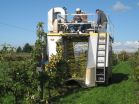(Press-News.org) Study results of CD19-directed chimeric antigen receptor (CAR) therapy using the Sleeping Beauty non-viral transduction system to modify T cells has demonstrated further promise in patients with advanced hematologic malignancies.
Patients who had acute lymphocytic leukemia (ALL), non-Hodgkin lymphoma (NHL) or chronic lymphocytic leukemia (CLL) were part of clinical trials at The University of Texas MD Anderson Cancer Center, which used the Sleeping Beauty gene transfer system initially discovered at the University of Minnesota.
Results from the study were presented at the 56th Annual Meeting of the American Society of Hematology (ASH) annual conference in San Francisco and were published in the Dec. 5 issue of the ASH journal Blood.
The Sleeping Beauty gene was named for its ability to "awaken" an extinct transposon - DNA that can replicate itself and insert the copy back into the genome. This allows a gene to be transferred into a DNA molecule known as a plasmid. An enzyme called a transposase binds to the plasmid, cuts the transposon and gene out of the plasmid and pastes it into the target DNA sequence. This gene transfer system was the basis for the MD Anderson clinical trials.
Using the Sleeping Beauty gene transfer system, Laurence Cooper, M.D., Ph.D., professor of pediatrics and Partow Kebriaei, M.D., associate professor of stem cell transplantation and cellular therapy, were able to plug a gene into T cells, creating an artificial or chimeric antigen receptor (CAR) on the T cell that recognizes and binds to CD19, a cell surface on B cells. The resultant product known as CAR T cells are produced at MD Anderson and are being employed in the Sleeping Beauty clinical trials.
"We are treating patients with advanced CD19 positive hematologic malignancies using CAR T cells in combination with conventional blood stem cell transplantation," said Kebriaei. "We are also treating patients who had active disease but had not received blood stem cell transplantation."
Patients were recipients of autologous (patient's own cells) or allogeneic (donor cells) stem cell transplantations, which were administered in combination with CAR. Kebriaei reported no acute or long-term toxicity in the 33 patients treated.
"Five patients at high risk for relapse were treated with CAR T cells along with autologous stem cell transplant, and four of those patients remain in complete remission with a median follow-up of 12 months," she said. "Among 13 patients treated with donor CAR T cells after allogeneic stem cell transplantation, six remain in complete remission with a median follow-up of 7.5 months."
Kebriaei also reported that five out of 14 patients treated with CAR T cells for active disease who did not undergo blood stem cell transplantation showed disease regression with a median follow-up of six months.
INFORMATION:
MD Anderson study participants included Helen Huls, Harjeet Singh, Ph.D., Simon Olivares, Matthew Figliola, Sourindra Maiti, Ph.D., Su Shihuang, Ph.D., Pappanaicken Kumar, Bipulendu Jena, Ph.D., Sonny Ang, Ph.D., and Jackson Rineka, all with pediatrics; Marie Andree Forget, melanoma medical oncology; Tingting Liu, Ian McNiece, Ph.D., Gabriela Rondon M.D., Chitra Hosing, M.D., Elizabeth Shpall, M.D., and Richard Champlin, M.D., stem cell transplantation and cellular therapy; and William Wierda, M.D., Ph.D., Susan O'Brien, M.D., Michael Keating, MBBS, and Hagop Kantarjian, M.D., leukemia. Also participating was Perry Hackett, Ph.D., genetics cell biology and development, University of Minnesota.
The study was funded by the National Institutes of Health and the Cancer Prevention and Research Institute of Texas. Continued development of this approach is proceeding under MD Anderson's Moon Shots program to accelerate the pace of converting discoveries into clinical advances that reduced cancer deaths.
Low doses of fluoxetine - better known as the anti-depressant Prozac - could hold the key to preventing PMS symptoms, an international team of researchers has found.
Up to 80 per cent of women are thought to suffer from premenstrual syndrome (PMS), which can be a debilitating condition with symptoms such as anxiety, irritability, fatigue, sleep deprivation and increased sensitivity to pain.
PMS appears to be triggered by the fall in secretion of the ovarian sex steroid hormone progesterone that occurs towards the end of the menstrual cycle and leads to a decline in ...
In 2012 the Mars Science Laboratory landed in the fascinating Gale crater. The Gale crater is of such great interest because of the 5.5 km high mountain of layered materials in the middle. This material tells an intricate story of the history of Mars, perhaps spanning much of the existence of this mysterious planet.
Once positioned, the Curiosity rover began field studies on its drive toward Aeolis Mons (also unofficially known as Mount Sharp), the central peak within the crater. Curiosity has travelled more than 9.4 km so far and during its trip up the mountain, Curiosity ...
A new advance in biomedical research at the University of Leicester could have potential in the future to assist with tackling diseases and conditions associated with ageing - as well as in treating cancer.
The research, which has shown promise in clinical samples, has been published in the prestigious scientific journal, Cell Death and Disease.
The group of scientists coordinated by Dr Salvador Macip from the Mechanisms of Cancer and Ageing Lab and the Department of Biochemistry of the University of Leicester carried out the study to find new ways of identifying old ...
Insects are full of marvels - and this is certainly the case with a beetle from the Tenebrionind family, found in the extreme conditions of the Namib desert. Now, a team of scientists has demonstrated that such insects can collect dew on their backs - and not just fog as previously thought. This is made possible by the wax nanostructure on the surface of the beetle's elytra. These findings by José Guadarrama-Cetina, then working at ESPCI ParisTech, France - on leave from the University of Navarra, in Spain - and colleagues were recently published in EPJ E. They bring ...
MOUNT VERNON, WA - Cider - or "hard cider" as it is typically known in the United States - is experiencing a real revival. The fermented apple juice with 0.5% to 7% alcohol-by-volume is the fastest growing alcohol market segment in the US, boasting a 54% increase in production annually from 2007 to 2012. Naturally, increasing consumer demand for cider translates to a need for more apples to make quality cider products.
Carol A. Miles and Jaqueline King from Washington State University's Department of Horticulture published a study in HortTechnology that can provide apple ...
An article published in the Health Affairs December issue is the first ever comprehensive analysis to investigate the Affordable Care Act's (ACA) Essential Health Benefit (EHB) as it relates to children. The study found that the EHB has resulted in a state-by-state patchwork of coverage for children and adolescents that has significant exclusions, particularly for children with developmental disabilities and other special health care needs.
Previous studies have compared the EHB standard more broadly to the Children's Health Insurance Program (CHIP), but this analysis ...
WEST LAFAYETTE, IN/ITHACA, NY - Energy costs account for one of the largest expenses in commercial greenhouse production of annual bedding plants. Naturally, bedding plant producers are searching for more energy-efficient production methods that can reduce fuel usage and increase profits. Christopher Currey, Roberto Lopez, and Neil Mattson published a study in HortTechnology that gives growers in northern latitudes valuable information on finishing practices for annual bedding plants. The researchers compared traditional heated greenhouses with unheated high tunnels for ...
(SAN FRANCISCO, December 6, 2014) - New treatment combinations and targeted therapies for lymphoma and multiple myeloma are improving outcomes for vulnerable patient populations with hard-to-treat disease, according to studies presented today at the 56th American Society of Hematology (ASH) Annual Meeting and Exposition.
Despite advances in lymphoma treatments, improving the prognosis for patients with relapsed and treatment-resistant disease remains a challenge. The early success of several precision therapies associated with fewer side effects than conventional approaches ...
(SAN FRANCISCO, December 7, 2014) - Studies presented at the 56th American Society of Hematology (ASH) Annual Meeting and Exposition compare new and standard-of-care treatments for blood clots and further illuminate clot risks in vulnerable populations, such as cancer patients.
Although significant advances have been made in the treatment and prevention of blood clots through new and improved therapies for clotting disorders, challenges remain in balancing the benefits and risks of these therapies. Specifically, while these treatments can reduce patients' risk of suffering ...
It is estimated that about 35 million people worldwide currently suffer from dementia and it is expected that the number will increase to 135 million by the year 2050. The disease is already one of the most common health problems in the elderly, which is why experts predict that the numbers of people affected will increase over time. Researchers at the Department of Psychiatry and Psychotherapy of the University Medical Center of Johannes Gutenberg University Mainz (JGU) have recently gained new insights into how it may in future be possible to treat patients with the currently ...




